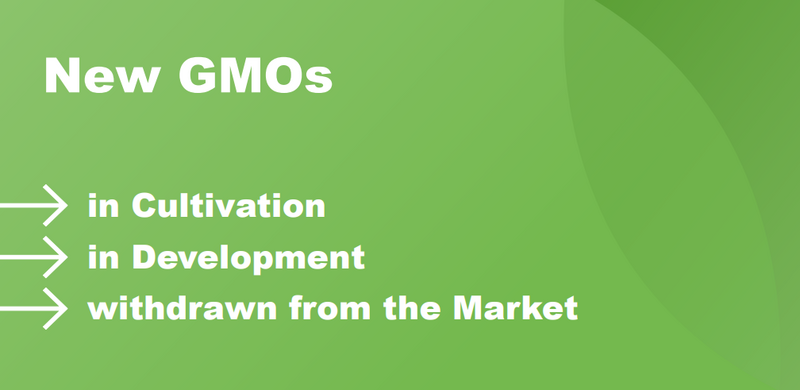News
New genetic engineering: More show than substance? "New GMOs Market Report" shows market reality and developments
This is shown in the "New GMOs Market Report: New GMOs in Cultivation, in Development, withdrawn from the Market" (see below), which was published on 10 June 2025 in Brussels jointly by the European Non-GMO Industry Association (ENGA) and the US Non-GMO Project. In view of the hype fuelled by influential lobbies and the political pressure to deregulate plants produced using new genetic engineering (NGT) in the EU, the report comes to a number of surprising conclusions:
- Currently, only three NGT plants are being cultivated worldwide, two in the US and one in Japan.
- The first two NGT crops to reach market maturity were withdrawn from the market due to their failure.
- Only two of the 49 crops currently "in development" could contribute to sustainability goals, which is supposedly the main added value of NGT crops.
Hardly any NGTs on the market
Anyone in the food industry who wants to produce or claim "Ohne Gentechnik" (Non-GMO) or "organic" products can and should continue to do so. This is because there is no flood of new NGT plants on the world market – quite the contrary. The two corn plants grown in the USA are resistant to insects and herbicides. In Japan, a tomato with an increased GABA level is being cultivated, which is said to lower blood pressure. Many of the 49 NGT plants in the development stage are already approved in some countries – especially in the USA – but are not yet being cultivated.
Sustainability? Not a chance!
"Despite the hype fuelled by biotech companies and many politicians, and despite intense pressure for extensive deregulation of these plants, the findings of our report are clear: So far, plants from new genetic engineering are only a promise and not a market reality," says ENGA Secretary General Heike Moldenhauer. "Furthermore, despite widespread claims, not a single plant currently on the market or in development delivers on the promise of sustainability. This is one of the main arguments used by proponents to push for comprehensive NGT deregulation – without risk assessment, traceability, labelling and transparency."
NGTs are treading water economically
"Efforts to bring the next generation of genetically engineered plants to market using gene editing technologies such as CRISPR are simply not gaining traction, despite lax regulations in places such as the United States, exaggerated sustainability promises and billions in public and private investment," sums up Hans Eisenbeis, Director of Mission and Messaging at the Non-GMO Project.
Preserving the successful "Ohne Gentechnik" and organic markets
"The report shows that economic reason alone dictates that we preserve the GMO-free food industry instead of jeopardising it in the interests of a technology whose actual potential is completely unknown," comments Alexander Hissting, Managing Director of the Association for Food without Genetic Engineering (VLOG). "The `Ohne Gentechnik‘ and organic sectors together account for consumer sales of around 34 billion euros in Germany. The German Minister of Agriculture, Alois Rainer, must therefore lobby the EU to ensure that full labelling requirements and transparent traceability are also maintained for new genetic engineering. That is only fair and anything but an NGT ban."
NGT plants also planned for direct consumption
The "New GMOs Market Report" also highlights the changes in the development of NGT plants compared to their "old" counterparts. While the application of "old" genetic engineering was largely concentrated on four plants (soybeans, corn, rapeseed, cotton), which are used as animal feed, ingredients for processed foods, fuel or clothing, the range of applications for NGT plants is much broader. Biotechnology companies are working on a variety of plants intended for direct human consumption.
More developers in NGT
The developers of NGT plants have also become more diverse: while plants using old genetic engineering were mainly produced and marketed by the "four giants of genetic engineering": Corteva, Bayer, BASF and Syngenta, many companies are now involved in the development of NGT plants, including government institutes. The report also provides an overview of the "regulatory hotspots" worldwide.
ENGA and the Non-GMO Project recommend that businesses in the food industry:
- Exclude NGT plants from the supply chain by means of appropriate supplier requirements.
- Rely on independent certification systems that guarantee that products are free of NGT plants. The currently relevant European "Ohne Gentechnik“ systems and organic production will continue to exclude the use of NGT plants in the future.
The "New GMOs Market Report" marks the start of an annual, updated series of reports designed to inform the food and feed industry about important developments in the field of NGT plants.
New Report shows Market Reality of New GMOs (ENGA, European Non-GMO Industry Association)

